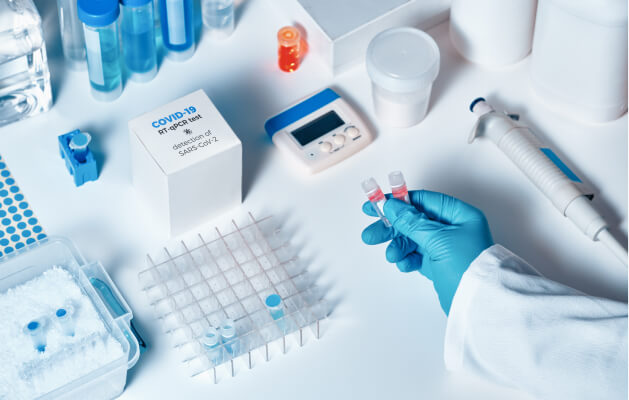

Welcome to POLIS, the advanced diagnostic test management software that streamlines the testing process from start to finish.Our cloud-based web application ensures that you can access POLIS from anywhere with an internet connection, and our compatibility with barcode scanners and test machine software like Catana and FastFinder makes sample batching a breeze. With POLIS, you can easily manage patient appointments and ensure that testing runs smoothly and efficiently. Our software allows you to schedule appointments, send reminders, and manage cancellations, all from a single, centralized platform. Our user management feature allows you to control access to the system and ensure that only authorized users can view and edit patient information.
Also With our diagnostic test software POLIS, which is very easy to use and you can create customizable workflows you can manage all aspects of your diagnostic testing workflow;
"A Diagnostic Test Management Software that Overcomes Traditional Cons"
Diagnostic test management software is a valuable tool that can streamline the process of diagnostic testing and improve the accuracy of test results. However, traditional diagnostic test management software can be costly, require implementation time, and be dependent on technology, making it challenging for some healthcare facilities to invest in such a tool. POLIS, a diagnostic test management software, overcomes these challenges by offering a software-as-a-service (SaaS) model that allows healthcare facilities to pay only for what they use, eliminating implementation challenges, and reducing their dependence on technology.
POLIS is a diagnostic test management software that overcomes the traditional cons of such software. By offering a SaaS model, POLIS allows healthcare facilities to pay for only what they use, eliminates the need for implementation, and reduces dependence on technology. These benefits make POLIS an excellent investment that can help to improve patient care and outcomes. With POLIS, healthcare facilities can streamline their diagnostic testing process, reduce errors, and provide better care to their patients.
Patient Registration refers to the process of capturing and managing patient information within the diagnostic test management software. It involves collecting and storing details such as patient demographics, contact information, medical history, and insurance details. This feature allows healthcare providers to efficiently register patients and maintain accurate records for streamlined testing processes.
Accession Management involves assigning unique identifiers or accession numbers to each diagnostic sample or specimen collected from patients. This feature helps track and manage samples throughout the testing workflow, ensuring proper identification, traceability, and minimizing errors. Accession management allows for efficient sample tracking and retrieval, improving overall laboratory efficiency.
Batch Management enables the grouping of multiple samples or tests together for streamlined processing. This feature allows laboratories to efficiently handle large volumes of samples by organizing them into batches. It simplifies sample tracking, reduces handling time, and ensures consistent and efficient testing across multiple samples.
Appointment Management facilitates the scheduling, tracking, and management of patient appointments within the diagnostic test management software. This feature enables healthcare providers to efficiently allocate time slots, send reminders, and manage cancellations or rescheduling. Appointment management streamlines the testing process, reduces patient wait times, and improves overall operational efficiency
Health Authority Reports and Integrations involve the seamless integration of the diagnostic test management software with relevant health authorities' systems. This feature allows for automated generation and submission of regulatory reports, ensuring compliance with reporting requirements. Integrations with health authorities enable efficient data exchange, reducing manual effort and enhancing data accuracy.
User Management refers to the administration and control of user accounts within the diagnostic test management software. This feature allows system administrators to create and manage user profiles, assign access privileges, and control permissions. User management ensures secure access to the software, restricts unauthorized access to sensitive information, and enables efficient collaboration among healthcare professionals.
Data Warehousing involves the storage, organization, and management of large volumes of diagnostic test data within the software. This feature allows for efficient data retrieval, analysis, and reporting. Data warehousing enables healthcare providers to access historical patient information, generate insightful reports, and make data-driven decisions for improved patient care and operational efficiency.
Sample Management refers to the comprehensive process of handling and tracking diagnostic samples within a laboratory or healthcare facility. It encompasses various activities such as sample collection, labeling, transportation, storage, and disposal. Effective sample management ensures the integrity and traceability of samples throughout the testing process, minimizing errors and maintaining data accuracy. It involves the implementation of standardized protocols, proper documentation, and adherence to regulatory guidelines. Sample management plays a crucial role in maintaining the quality and reliability of diagnostic testing, ultimately leading to improved patient outcomes.
Test Planning involves strategic and systematic planning for diagnostic testing within a healthcare facility. It encompasses the selection, prioritization, and scheduling of appropriate diagnostic tests based on patient symptoms, medical history, and healthcare provider's assessment. Test planning considers factors such as test availability, turnaround time, cost-effectiveness, and clinical utility. It aims to optimize the utilization of resources, minimize unnecessary tests, and ensure timely and accurate diagnosis. Diagnostic test planning enhances efficiency in healthcare delivery, enables appropriate treatment decisions, and improves patient care and satisfaction.
You can use our POLIS software by starting the trial process with a preliminary application.
